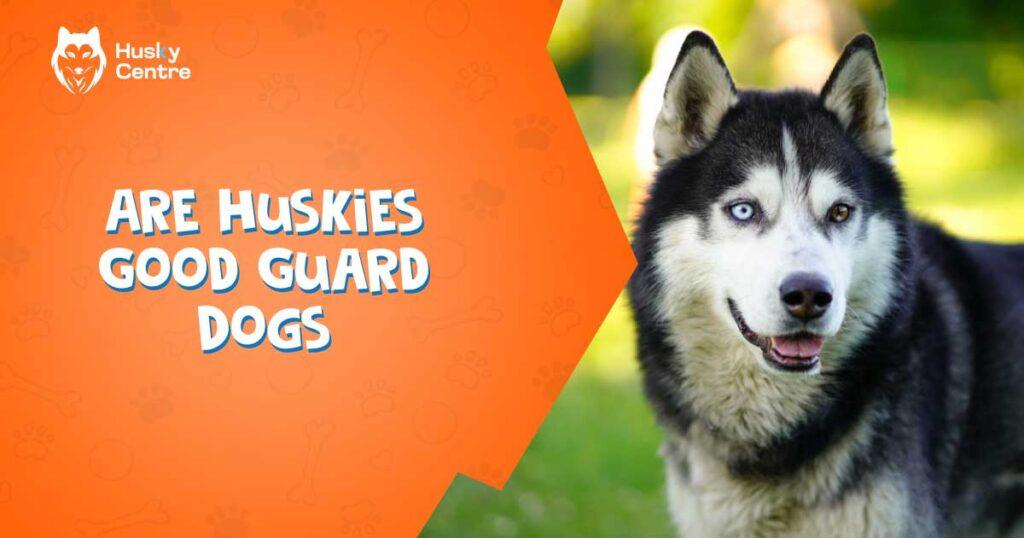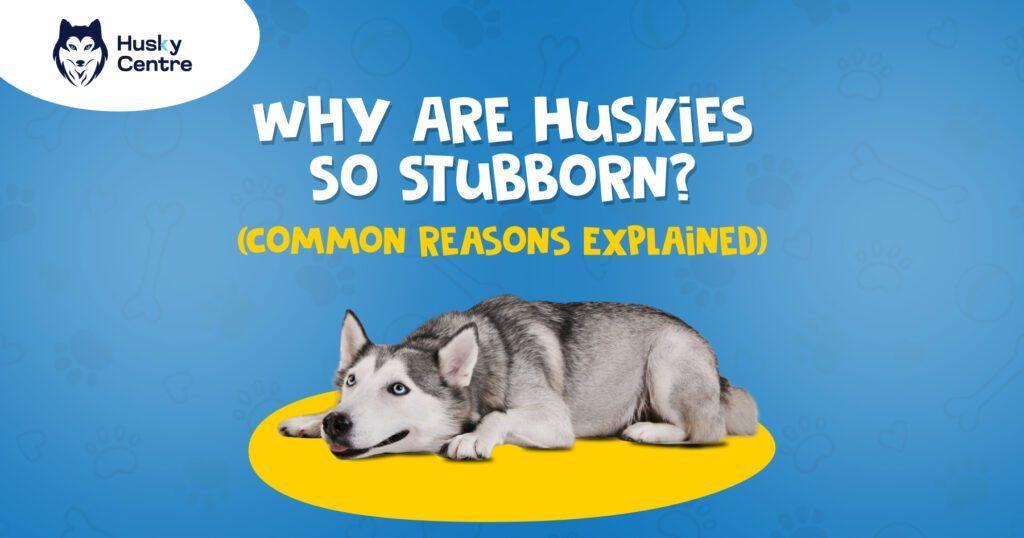Huskies are not ideal guard dogs due to their friendly nature. They lack the protective instincts typical of guard breeds.
Huskies are known for their striking appearance and energetic personality. Originating from Siberia, they were bred to pull sleds over long distances. Their friendly and sociable demeanor makes them great family pets. They tend to get along well with children and other animals.
While they are loyal and intelligent, their lack of aggression and wariness towards strangers make them poor choices for guarding tasks. Huskies are more likely to greet an intruder with enthusiasm rather than suspicion. They thrive on companionship and require regular exercise. Proper training and socialization can help manage their energy and friendly nature.
Temperament And Behavior Of Huskies
Are Huskies good guard dogs? To answer this, let’s explore the temperament and behavior of Huskies. These traits reveal whether a Husky can protect your home effectively. Understanding their nature helps you decide if they are the right fit for your security needs.
Friendly Nature
Huskies are known for their friendly and sociable nature. They usually get along well with everyone. This includes strangers, which is not ideal for a guard dog. Huskies often greet new people with wagging tails and excitement. Their lack of suspicion toward strangers makes them less effective as watchdogs.
Here are some key traits of their friendly nature:
- Outgoing personality: They love meeting new people.
- Gentle demeanor: Huskies are rarely aggressive.
- Affectionate: They enjoy being petted and cuddled.
- Playful with kids: They are great around children.
Although their friendliness is a wonderful trait for a family pet, it doesn’t translate well into guarding behavior. A guard dog needs to be wary of strangers, which Huskies are not.
Pack Mentality
Huskies have a strong pack mentality. They thrive in environments where they feel part of a group. This can be both a strength and a weakness.
On one hand, their loyalty to their pack (family) is strong. On the other hand, their need for companionship can make them more accepting of new people.
Important aspects of their pack mentality include:
| Characteristic | Description |
| Loyalty | Huskies are loyal to their family but not necessarily protective. |
| Socialization | They need regular interaction with other dogs and people. |
| Separation Anxiety | They may get anxious when left alone for long periods. |
Their pack mentality means they enjoy being around others. They might not react aggressively to strangers, which is a key trait for a guard dog. Instead, they may welcome them into the pack.
Energy And Playfulness
Huskies are full of energy and playfulness. They need lots of exercise to stay happy and healthy. This high energy level can sometimes be mistaken for aggression, but it’s usually just exuberance.
Their playful nature makes them great companions for active families, but it doesn’t make them good guard dogs.
Key points about their energy and playfulness:
- High Exercise Needs: They require long walks, runs, or play sessions.
- Playful Demeanor: They enjoy games and activities.
- Intelligent and Curious: They need mental stimulation as well.
- Not Territorial: They don’t guard their space aggressively.
This energy needs to be channeled properly; otherwise, they can become destructive. While their playfulness is endearing, it doesn’t contribute to guarding behavior. Huskies prefer playing with new people rather than chasing them away.
Traits Of An Effective Guard Dog
Many people wonder, are Huskies good guard dogs? To answer this, we need to explore the traits of an effective guard dog. Guard dogs need specific qualities to protect homes and families.
These traits include protective instincts, territorial behavior, and alertness and responsiveness. Let’s dive into each trait to see if Huskies fit the bill.
Protective Instincts
Guard dogs must have strong protective instincts. These instincts drive them to protect their owners and property.
Huskies have a friendly nature. They are known for their love of people. This can make them less effective as guard dogs.
Here are some key points about protective instincts in guard dogs:
- Loyalty: A guard dog must be loyal to its family.
- Aggression when needed: They should show aggression if a threat is present.
- Courage: Guard dogs need to be brave and stand their ground.
Huskies are loyal and love their families. Yet, they often lack the aggression needed for a guard dog role. They are more likely to greet strangers with a wagging tail than a growl. This friendly nature can be a drawback for guarding purposes.
Territorial Behavior
Territorial behavior is another key trait of effective guard dogs. These dogs should protect their home and yard. They should bark or show aggression to intruders.
Huskies are not very territorial. They were bred to work in packs and share space.
Important aspects of territorial behavior include:
- Marking territory: Guard dogs often mark their territory with scent.
- Barking at strangers: They should alert their owners to strangers.
- Guarding boundaries: They should patrol and guard the property’s boundaries.
Huskies may not show strong territorial behavior. They don’t often bark at strangers. They might not guard the boundaries of their home. This lack of territorial instinct can make them less effective as guard dogs.
Alertness And Responsiveness
Effective guard dogs must be alert and responsive. They need to notice any unusual activity and respond quickly. Huskies are very alert. They have keen senses and notice changes in their environment.
Here are some points about alertness and responsiveness:
- Quick reactions: Guard dogs should react quickly to threats.
- Sharp senses: They need strong hearing and sight.
- Training: They should respond well to their owner’s commands.
Huskies are highly alert and have quick reactions. They can be trained to respond to commands. Yet, their friendly nature can still be a drawback. They might notice a stranger but not see them as a threat. This can limit their effectiveness as guard dogs.
Husky Traits As Guard Dogs
Huskies are known for their striking appearance and friendly demeanor, but are they good guard dogs? Understanding Husky traits as guard dogs can help determine if they are suitable for protecting your home.
Lack Of Aggression
Huskies are generally not aggressive dogs. They are friendly and social, often welcoming strangers with a wagging tail and a playful attitude.
While this makes them great companions, it also means they might not be the best choice for a guard dog.
Here are some key points about their lack of aggression:
- Friendly Nature: Huskies are known for their friendliness. They tend to greet everyone with enthusiasm, which is not ideal for a guard dog.
- Low Territorial Instincts: Unlike some breeds, Huskies don’t have strong territorial instincts. They do not see strangers as a threat.
- Playful Attitude: Their playful nature means they are more likely to engage in play rather than defend a property.
Their lack of aggression can be seen as a positive trait for families, but it does not make them suitable for guarding purposes.
Vocalization
Huskies are known for their unique vocalizations. They don’t bark as much as other breeds but communicate through howling, whining, and talking-like sounds.
Let’s explore how their vocalization impacts their role as guard dogs:
- Howling: Huskies are famous for their howling. This can alert owners to unusual activities but may not deter intruders.
- Talking: They often ‘talk’ by making various sounds. This can be entertaining but is not effective for guarding.
- Whining: Huskies whine to express needs or emotions. This does not contribute to their guarding abilities.
While their vocalization is unique and entertaining, it does not make them effective guard dogs. They may alert you to something unusual, but they do not intimidate intruders.
Deterrent Appearance
Huskies have a striking and wolf-like appearance. Their looks can be a natural deterrent for some intruders.
Consider these aspects of their appearance:
- Wolf-like Features: Huskies have piercing eyes, erect ears, and a sturdy build. These features can make them look intimidating.
- Size: They are medium to large-sized dogs. Their size can deter people from approaching your property.
- Fur Coat: Their thick fur coat gives them a majestic look. This can add to their intimidating presence.
While their appearance can be a deterrent, it is not enough to make them reliable guard dogs. Their friendly nature and lack of aggression overshadow their intimidating looks.
Pros And Cons Of Huskies As Guard Dogs
Many people love Huskies for their stunning looks and playful nature, but are Huskies good guard dogs? This question is essential for those considering a Husky for home protection.
Understanding the pros and cons of Huskies as guard dogs will help you make an informed decision.
Pros
Huskies have some traits that make them potentially good guard dogs. Below are some of the key advantages:
- Intelligence: Huskies are very smart and can be trained for various tasks.
- Alertness: They are highly alert and can detect unusual activities quickly.
- Energy: Their high energy levels make them active and responsive.
- Strength: Huskies are strong and can be physically imposing.
Huskies also have a strong sense of territory. They often become very attached to their homes and families. This attachment can make them protective. Their wolf-like appearance can also be a deterrent to intruders.
Here’s a quick look at the pros in a table format:
| Pros | Description |
| Intelligence | Can learn and execute commands effectively |
| Alertness | Quick to notice unusual activities |
| Energy | Active and responsive |
| Strength | Physically imposing |
Cons
Despite their many positive traits, Huskies also have several drawbacks as guard dogs. Understanding these cons is crucial:
- Friendly Nature: Huskies are often too friendly with strangers.
- Stubbornness: They can be very stubborn and may not always follow commands.
- Escape Artists: Huskies are known for trying to escape, which can be problematic.
- Prey Drive: Their strong prey drive can distract them from guarding tasks.
Huskies love people, which can make them poor guard dogs. Their friendliness might lead them to greet intruders rather than deter them. Their stubborn nature can also be a problem, making them less reliable in critical situations.
Here’s a breakdown of the cons in a table format:
| Cons | Description |
| Friendly Nature | Too friendly with strangers |
| Stubbornness | May not always follow commands |
| Escape Artists | Known for trying to escape |
| Prey Drive | Strong prey drive can be distracting |
Alternative Roles For Huskies
Many people wonder, are Huskies good guard dogs? While these majestic dogs are not typically known for their guarding abilities, they excel in various other roles.
Huskies are friendly and social creatures. They make excellent companions and can perform a range of tasks. Let’s explore some alternative roles for Huskies.
Companion Animals
Huskies are wonderful companion animals. Their friendly and playful nature makes them perfect for families. They love being around people and other pets. Here are some reasons why Huskies make great companions:
- Loyalty: Huskies are very loyal to their families.
- Energy: They have a lot of energy, which makes them great playmates for kids.
- Social: They enjoy socializing with other dogs and people.
- Intelligent: They are very smart and can learn new tricks quickly.
Besides their friendly nature, Huskies are also known for their beautiful appearance. Their striking blue eyes and fluffy fur make them stand out. They love to cuddle and can be very affectionate. This makes them perfect for those who want a loving and attentive pet.
Huskies also have a calming presence. Their gentle nature can provide emotional support to their owners.
This makes them ideal for people who need a companion for mental well-being. They can help reduce stress and anxiety.
Working Dogs
Though not guard dogs, Huskies are excellent working dogs. They have been used for various tasks for centuries. Here are some roles where Huskies excel:
| Role | Description |
| Sled Dogs | Huskies are famous for their sled-pulling abilities. They are strong and can endure harsh conditions. |
| Search and Rescue | With their keen sense of smell, Huskies can help in search and rescue missions. |
| Therapy Dogs | Their gentle nature makes them great for therapy work in hospitals and nursing homes. |
Huskies have incredible stamina. They can run long distances without getting tired. This makes them perfect for activities like hiking and running. They love to work and need regular exercise to stay happy and healthy.
Huskies are also very smart. They can be trained for various tasks. Their intelligence and eagerness to learn make them versatile working dogs. They can assist in different kinds of work, from pulling sleds to providing therapy.
Frequently Asked Questions
Will A Siberian Husky Protect Its Owner?
Yes, a Siberian Husky can protect its owner. They are loyal and alert, but not typically aggressive. Their protective instincts may vary.
Will A Husky Protect You From An Intruder?
A husky is not typically a guard dog. They are friendly and social, often lacking protective instincts.
Can Huskies Become Guard Dogs?
Huskies can be guard dogs, but they aren’t ideal. They are friendly, social, and lack aggressive traits needed for guarding.
What Is The Best Dog For Protection?
The best dog for protection is the German Shepherd. They are loyal, intelligent, and highly trainable. Other top breeds include Rottweilers, Doberman Pinschers, and Belgian Malinois. These dogs offer excellent protection and companionship.
Conclusion
Huskies are not ideal guard dogs due to their friendly nature. They excel as loyal companions and family pets. Their intelligence and energy make them great for active owners. If you seek protection, consider breeds known for guarding instincts. Huskies will still bring joy and love to any home.


Meet Jarred, the heart and soul behind HukyCentre. With a deep affection for furry friends, he pours his passion into every word he writes. His genuine love for dogs shines through in his engaging and informative content. As a dedicated dog enthusiast, Jarred’s goal is to share valuable insights and tips that resonate with fellow dog lovers. Join Jarred on the journey as he celebrates the joy and companionship that dogs bring into our lives.



